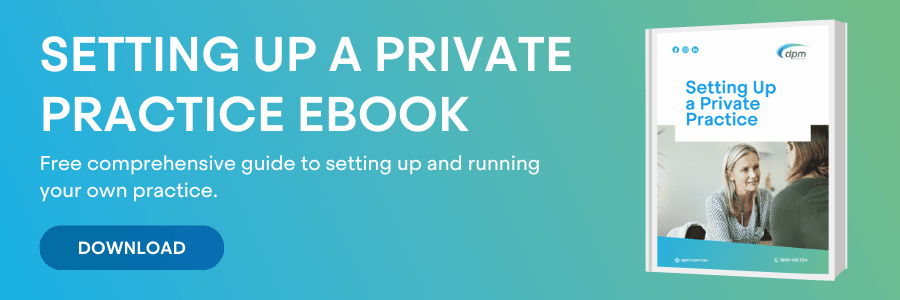If you are dreaming of owning a private medical practice now or in the near future, there are two main options to consider:
Setting up a new private medical practice
The process of setting up a medical practice can be quite daunting, bringing in some challenges along the way.
However, it can also be very exciting as starting a medical practice of your own from scratch will allow you to control every little detail of the practice, including the design, culture, positioning, etc.
Buying an established private medical practice
For practitioners not yet ready to start their own practice from scratch due to concerns about cash flow, business skills and administration; an alternative is to buy into an existing medical practice.
There may be many advantages of buying an established private practice, such as:
- potentially more financially suited to your current situation
- existing setup with equipment and fitouts already in place
- experienced staff
- an existing client/patient list
- not as much planning required
- less needs to spend on marketing (compared to a brand new practice)
Indeed, you would have a predictable cash flow from the very beginning, with everything you need to run the practice already in place, including staff who know the business and how to do their job.
In fact, depending on the type of practice, a GP or Dentist may inherit a full list of patients who return for regular treatment; whereas it may not be the same for every specialty, as specialists tend to generally see patients for a one-off treatment, so there is no real ongoing patient book.
What to consider?
Here are the 8 main things to consider before you decide to take the plunge to owning a medical practice:
Have a business objective
What does success look like and how will you achieve your goals? Are you an entrepreneurial mind who’ll enjoy the whole process of building your own practice and get into the details, or you’d rather focus on your medical activity and reap the benefits of an existing practice?
Geography and demographics
Metropolitan areas are usually more expensive to lease or buy into compared to country areas; but will probably bring in more clients, depending on your competition.
You need to use your network in your field to stay informed about the competition and the demographics of your prospective clients.
Location
What zone are you in? and how accessible is your practice? Access and parking for both staff and clients is crucial.
Is the property located on a main road with foot traffic? Is it near pharmacies or shopping centres?
Is the property commercially built or a converted residential premise? – this can affect the terms of the commercial loan and your borrowing power.
Asset value
Is the existing equipment owned or leased? What is the realistic asset life before an upgrade is required?
Older practices may have outdated computer systems and inefficient billing or scheduling software. What is the cost of purchasing or leasing equipment or fitouts up to your standards and the relevant tax implications?
Human resources
Will you be hiring? Existing employees may need to be taken through a change management process or be required to undertake training if you are bringing in new systems and policies.
New staff can be more flexible in some ways but are untested. Would you employ family for administration roles? What does that mean for their onboarding?
Liabilities and cash flow
If you buy into an existing practice, dig deeper to find out: what are its liabilities? Are they up to date with payments such as tax, superannuation and long-service leave?
If you set up a new practice, have you prepared a cashflow forecast to account for all your expenses and allowed for variances?
Cash flow can be tight during the early stages of a new practice or even in particular months for an existing practice.
Taxation, employment and compliance need to be accounted for as you make the transition from being a doctor to a doctor who is a small business owner.
You also need to consider whether there will be advertising costs associated with branding; or rebranding?
Valuation and business agreement
Due diligence is paramount.
A professional valuation via a review of financial statements is recommended to determine the income earning capacity of an existing practice as well as agreements and a specific exit strategy for the existing owner.
For business finance, lenders will take into consideration:
- Total revenue;
- Gross margin; and
- Wages for revenue figures.
They’ll also consider the asset’s quality position, financial performance of each of the above aspects and how they impact the business overall, as well as the industry environment and existing market competition.
Structure and strategy
Consider corporate structure, insurance, practice management, billing and your career flexibility when owning a medical practice as well as future expansion and / or exit strategy.
Bringing other practitioners into the practice can help with the expenses as contracting doctors pay about 30-40% of their income back to the practice to cover administration, staffing and other costs.
Adequate income protection, accident and life insurance is a must when you are your own business’ asset. Help from a team of trusted advisers such as a specialised accountant and specialist lender can be invaluable.
So what are my financing options and how much can I borrow?
A deep understanding of the industry is important when applying for finance and this is where a specialist lender like DPM can help. In general context:
- Borrow up to 100% of the property value (freehold) with 20-30 year loan terms
- Borrow up to 100% of the business value (leasehold) including fit-out and equipment with approximately 10-15 year loan terms
- Principal and interest + interest only repayments available with some lenders tailoring loan repayments in line with your projected cash flow
- Interest rate discounts vary from lender to lender and the strength of your application
- You may be asked to provide a business plan including business forecasting
- Your previous experience and qualifications will be key to obtaining approval. Choosing the right lender and showing your strength as a borrower is crucial
Security for a practice loan can be either, some or all of the following depending on the loan structure and purchase price sought:
- Mortgage over freehold or leasehold with a specific charge over business assets;
- Mortgage over your home;
- Registered fixed or floating charge over the practice; and/or
- Directors’ guarantee.
Lastly, it is important to know that arranging finance for a doctor’s practice business loan usually takes between 6 to 10 weeks depending on the complexity of the purchase and your individual financial circumstances. Liaise with your accountant and finance consultant early to ensure settlement terms can be met.
All the best with your private medical practice project from the team at DPM!
Disclaimer: * The information contained in this site is general and is not intended to serve as advice. DPM Financial Services Group recommends you obtain advice concerning specific matters before making a decision.






